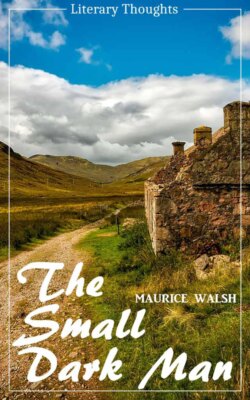Читать книгу The Small Dark Man (Maurice Walsh) (Literary Thoughts Edition) - Maurice Walsh - Страница 9
На сайте Литреса книга снята с продажи.
ОглавлениеIII
He did not delay long at the real summit. Twice the mist had rolled over him as he crossed the hollowed-out plateau to the summit-cairn, and twice he had waited grimly while the mist-whisperings approached and went by and died out. And always he had felt a great desire to crouch and move away from something that was creeping up behind him.
He had seen all he wanted to see that day; the sun was far down in the west; and somewhere below was Glen Dhu and sixteen miles of winding track. And so from the summit-cairn he went long-strided down the easy eastern slope, his old coat flapping like a mantle behind him, and his eyes watchful for the canyon of Loch Dhu. Presently the gentle slope he was on levelled out and even lifted into a slight ridge, and, thrusting upwards to the brow of it, he stopped dead. The whole side of the mountain was cut sheer away at his feet, and he looked far down into Loch Dhu, a long splash in the deep gut of the mountains. No sunlight shone on it—no sunlight ever did shine on it. In places it was black with depth, and in places purple, and in places dimly grey where basalt ledges came near the surface. At its upper end a fifteen-hundred-foot precipice lifted out of huge boulders into the breast of mighty Ben a Mhuic—a forbidding black precipice slashed with the red of iron and the white of snow. Where Hugh stood was the still clear light of the gloaming, but all Glen Dhu, as far as he could see, was in shadow, though, across the mile-wide chasm, the tops of the peaks stringing northward were lit with orange, a wild glare of colour over the gloom of the glen.
He had no trouble in finding a way down the pitch to the loch side: a stone ladder with the tilt of a steep roof, where a trickle of water slid and fell and tinkled and frail ferns drooped and nodded in the crannies.
When at last he reached the made path at the foot of the loch there was no glow on any hill, and the even hush of twilight was over all that heaped land. And yet the awesomeness had gone out of the landscape. There was no disturbing whisper off the heather, no wailing note from the cliffs of Ben a Mhuic, no sense of an inimical presence tugging at reason. Fifty yards below him the swift Abhain Ban, the clear-running river, ran checking and gurgling over its white-pebbled bed, and a green ribbon of grass looped in the windings of it; the great breasts of the hills, solemnly brown, lifted in a smooth swell to the immense blue arch of the sky where already a star was shining; and the white path of disintegrated granite, winding out of sight round a curve of the valley, called him forwards to a secure haven.
All that was demanded now was steady walking and, at the end, a meal and a drink with his great Tearlath. And meantime, by way of company, he would nibble an Abernethy biscuit and a scrap of cheese, and thereafter light a strong pipe of Tam o’ Shanter. It had been a hard afternoon: a four-thousand-foot mountain, climbed the long way, was behind him; sixteen miles of track curved in front of him; the dim shining night of the north was down on him; but he had still a kick left. A small dark man he was, who had gathered hardihood of mind in a hardy body, and made it natural and unassuming and almost secret. And though he was in a strange upheaved land, on a road he had never before set foot on, with no known landmarks to guide him, he was complete master of himself and not awed by his surroundings. He was a hillman.
Around the horn of that first curve was another curve exactly similar, and beyond that another and another—world without end. In the declining light, with the dim white line of the path ever tailing away in front of him, this similarity grew irksome in time. “A day or half a day might be pleasant on this road,” he said to himself, “but a man condemned to walk it forever would choose some other hell. ’Tis, surely, a terrible hell that begins by being pleasant.”
The zenith was scattered with faint stars, and the sky above the eastern ramparts aglow above a rising moon, when, at last, he won out of that first series of curves into the mouth of a side valley. And there he halted. A quarter of a mile away a small square window glowed at him with a dull-red light.
“The deer-stalkers’ bothy,” he spoke aloud, “and someone in it—two probably, and I’ll be damn’d if I’ll love them.”
